The Autobiography of Rilla Dudley
I did not know my father's parents. They were Orthodox Jews. My father was born in Warsaw; they lived in Zurich, and came to London and Brighton. His father was born in 1872 in Poland, and died in Zurich in 1915. My grandmother was born in 1874 in Vilnius, Lithuania. At some point they moved to Harrogate, with her second partner, an Orthodox Jewish Rabbi, who edited a Yiddish anarchist newspaper. She had an up-market chain of gown shops - my uncle said in the film where Agatha Christie disappears - to Harrogate - the shop she visits was a replica of his mother's shop. They moved to Haifa in the 1930s.
My first home was in Cranbrook, where my father taught at the school. At some point we moved to my grandparent's house in Glasgow - I'm not sure when my father was teaching in Coventry. I think I remember listening to my grandfather's gold pocket watch, and possibly eating chocolate in front of a long mirror. My sister was born there two years after me, but I have no memory of that. I think I remember a train journey when we came to the village in Leicestershire when I was three. I think my grandfather must have died, because I remember my grandmother staying with us for quite a while - she babysat while my parents went out dancing in the village hall.
I was sent to school when I was four and a half - because my mother couldn't cope with the two of us - we didn't get on - we were never close. She was as obstinate as my mother but from an early age I think, ambitious,
My grandmother was calm. I remember winding wool, but that was for my mother. My grandmother did extremely fine crochet, which looked like lace. She was also a good cook. She moved to a picture book cottage, roses round the door, etc. in Lincolnshire. The neighbours said a room off the dining room, had held contraband from smuggling brothers, and the bathroom downstairs had been the sister's shop. There were only four houses at Huttoft Bank, a few miles from another village. There was a big garage made out of driftwood. Across the road was a golf course and then the sea... lovely for us to go on holiday, but how terribly isolating for my grandmother who only rode a bike. She played the piano for the Mother's Union. We had her piano - she was an excellent site-reader - we used to sing Gilbert and Sullivan round the piano. She came to live with us for a while when she was flooded in 1953.
I remember playing Chinese chequers with beautiful marbles, and other games by the open fire - sea-coal gathered from the beach. At the beginning there was only calor gas, and the water had to be pumped with a lever at the sink, and she had flat irons, There were deliveries from the baker, and a grocer's van. She dressed crabs which a neighbour caught, and his sister reared chickens, which we saw from eggs, chicks to the table. My sister and I slept upstairs in a large feather bed, with a beautiful silk Turkish rug on the floor. There were things from China - a sailing uncle. My grandmother was very proud of her initials H.M.S. Helena Mable Sarah (born 1885). Her father's family went back a long way in the navy, her father was a marine engineer - and my grandfather (born1877) was an Admiralty Machinery Overseer. They met in Bermuda, and she had a jar of pink sand from Bermuda in a jar, and a full set of Dickens and H.G.Wells.
She came to live with us for a while when we were in London, but we were teenagers then, and my father didn't get on with her. She had her own room, and we became quite distant, although she and my mum were close. Eventually she moved to a house in Glasgow, which was near her youngest daughter. We met her family once when we visited her in Lincolnshire.
It was sad. I think as children, you accept what is and take things for granted. My children had good involvement with my mum when they were young, but when they became older and it is similar in my case, closer when the children are young.
My grandma was lovely, but I think I took her for granted. I think those holidays were therapeutic for my mum I don't remember my father featuring - and my sister and I enjoyed our seaside holidays. My mum would take us swimming, whatever stage the sea or tide was - really rough and breaking on the stone steps ....she was a great swimmer - and we would get back for breakfast, with marmalade in a green pottery jar with a bee on top and delicious warm soft rolls from the baker.
Life in Sileby, a Leicestershire village 1948-1957
"I'm a foreigner in these parts", my mother was informed, by a woman who lived across the road from us. She came from a village a few miles away, Mountsorrel. but we, and particularly my father, really were foreigners. My father used to cycle off to teach four foreign languages at a Roman Catholic boys boarding school, a few miles away, and he wore a beret. Most people couldn't get their heads round our surname, Hauskind, and called us Anglicised versions, like Hoskins, or Houskins. My father had come from Warsaw, Zurich, various places in England, including Cranbrook (taught at the school) where I was born, and finally from Glasgow, where my sister was born. She was about one and I was about three.
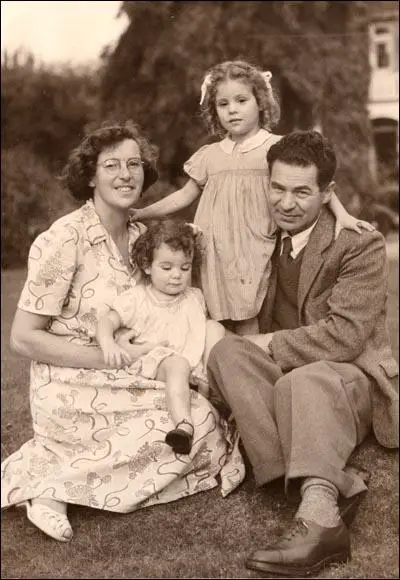
We lived at 8, Jubilee Avenue, a cul-de-sac, at the end of the village, in a three bedroomed semi, with a long garden at the back, which included a lawn, a sand pit, and lots of fruit bushes... we always had lots of blackcurrant jam. If I looked out of my bedroom window, all I could see was fields, with the corn in stooks at the appropriate time. Apart from the birds, the sound I woke up to was the baying of hounds - we were near the famous Quorn Hunt, and Leicestershire is a hunting county.
Virtually no-one had a car, so the street was our playground. The games were seasonal: whip and top in the spring, marbles and snobs - the local name for five-stones, - in the summer, along with marbles - either chinks and spans, or choc-hole - I won a lot - roller skating, and there was cricket and football, but that was more for the boys,
At the beginning of the road was the bus stop. There was one bus an hour, and I used that for my piano lessons to Loughborough, about 8 miles away, and to my Grammar school, Quorn, about 4 miles away. I never did miss that bus, but I used to have nightmares about missing it - I think that is why I still get nervous at airports in case I miss the plane. I didn't have any problems with the tube when we moved to London - I was often only just in time for school.
We walked about a mile down the hill into the village. On the way was a little shop, where everything was weighed, and the sugar and salt? was sold in blocks, which was brought home to be crushed. There were two grocers, two butchers, two sweet shops, we bought kayly - spelling? - which was a bit like sherbert, but tasted nicer, and made our finger turn green or pink when you dipped it in the paper bag, and licked it.
There was also a station, and occasionally we went to Leicester to buy clothes and have lunch in the department store, I always had sausages, peas and mashed potatoes, and asked the little band to play The Teddy bears' picnic.
We were well endowed with churches, which marked the time of the year with various events. There was one beautiful quite large Norman Church of England (quite low) two Methodists - Primitive and Wesleyan, Baptist and a Roman Catholic Church.
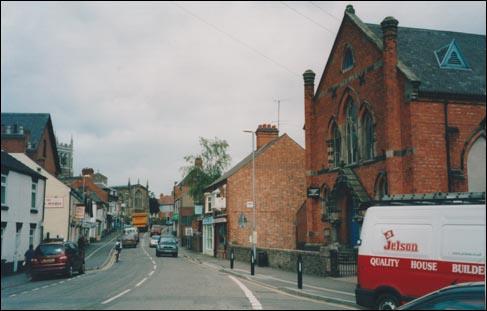
The Methodists had an Anniversary that happened in the Summer - it was a reason to have new clothes and they went through the village. I don't know what it was an Anniversary of.
We had a garden party held in the vicarage garden, that was lovely. There was tea and stalls and the usual things. One year a few of us girls were dressed as Bo-Peeps... here is the photo.
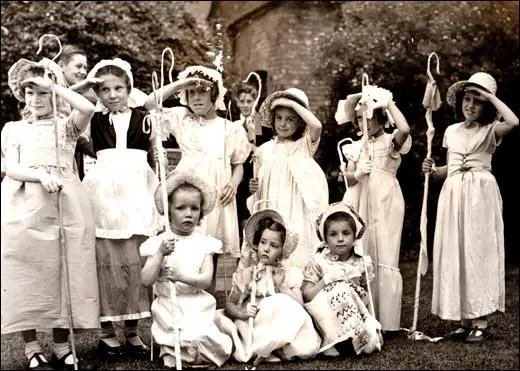
There was also Christmas when we took our toys for poorer children, and Harvest Festival. We took fresh produce, and the church was beautifully decorated with sheaves of corn etc...
We were regular attenders at the morning service - that is how I know my Bible - listening to the sermons and lessons etc. and I still know the old hymn tunes and prayers etc. We went to Sunday school in the afternoon. . When we moved to London we went to the Unitarian church... The C of E was very high church there.
Once a year, a train was booked, which I think was through the churches, and families had a day out to Mablethorp. There was a beach and a funfair. My sister and I went under the wing of another family - I'm not sure why - maybe my parents didn't fancy it. The same applied to Pantomimes, and Circuses.
However, my mother took me to classical music concerts in the De Montfort Hall, and to the ballet, in Leicester, which I loved. I had to be taken out of Pinnochio at the cinema because I cried - it was his long nose...we did have a cinema in the village. I went as a friend's party treat... an unsuitable war film, and I was really scared of cowboy pictures.
I had ballet lessons in Loughborough after my piano lessons, where I was joined by my sister, and then we went on to play the violin in a junior orchestra in another town by bus. Eventually a local girl set up a dance school, and I did ballet, and my sister acrobatics. We put on a concert and I had a tutu.
Most people worked at the boot and shoe factories, or the shops etc. However, there was another piano teacher my sister went to, and my parents became friendly with her, and also joined a WEA class for music.
We had our piano tuned by a local man, with three children. One day he took all our family in his car to Belvoir Castle, which was a treat. I wondered later....because he committed suicide by putting his head in the gas oven. He left a note saying he had stomach cancer, which the Doctor said was not true. They stayed in the same house, so I don't know how they managed. In that village, everyone was related...I didn't know until I had left, that the mother of the one girl I stayed in touch with, was related to the widow. A near neighbour was the retired headmaster from the junior school who lived with his sister, and a labrador called Donny . He was keen on botany . Out of the blue - I think I might have been ill - I just remember it arriving - he gave me a picture - in a big black frame - I had it reframed,- and it is one of a few seascapes I have.
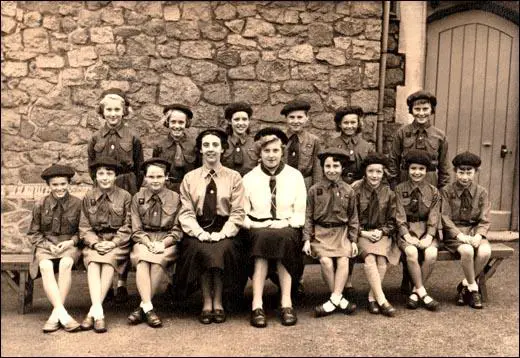
We both belonged to the Brownies, which I really enjoyed. This was held in the Pochin hall, between the Church and the infant school, so outside activities took place in the playground. My sister had the reputation for being the naughtiest Brownie. Afterwards, on the way home, several girls had 2d worth of chips, wrapped in newspaper, from the shop run by two old ladies. We were never allowed.
One of my favourite places was the mill. You walked down a lane near the church - it was a school nature walk once. My mum asked for celandine for mother's day, which we gathered there. It was a paper mill, so there was a lot of foamy effluent, which I liked . When I went back, that wasn't in operation, but there were several boats to hire.
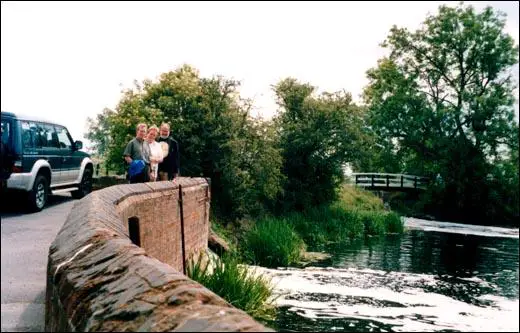
I never was good at sport. We had dance in the nearest Methodist hall, where we also had our school lunches. We had P.E. out on the concrete playground of the school, but for the Coronation, the "rec" as we called it, - it had a few swings, a roundabout, and a field, - was used as a sports field. The only certificate I ever won for sport (plenty for piano) was for the egg and spoon race. It was a grey miserable day, a bit rainy - in the morning we had gone to a neighbour and watched the Coronation on their black and white TV, and then there was the sports event. This was followed by a tea, for the children in different church halls - I wasn't with my sister - but eventually we all met up. We were given a Coronation mug.
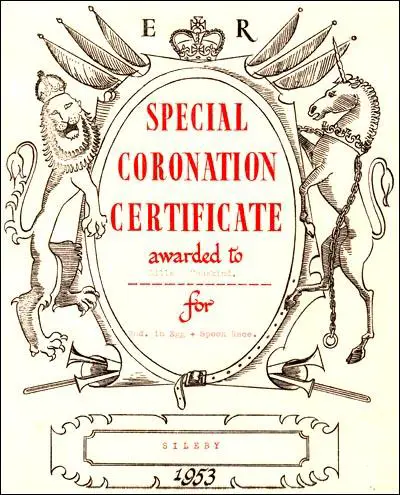
I was quite happy living in the village - I think we were rather the odd ones out - we didn't have ice- cream from the van, and we didn't have many shoes. But my parents spent their money in different ways - a radiogram with Classical records. Every year we went to see a Gilbert and Sullivan production at my father's school, which gave me a life long love. We used to sing the songs round the piano when my grandmother played for us. We went on cycle rides as a family, and we would cycle to Leicester on busy roads, to go swimming. My mum wasn't afraid to be different - she had her values. I put this on my children - my daughter was a trend setter using the Charity shops when she was a teen and I've not been afraid to hold the minority view.
My mother must have found it quite difficult living there - I would have done- so she founded the town's Women's Guild - which continued to flourish, so she left a legacy. I have fond memories of village life there, but I think it was partly because I was a child. I didn't have any other relatives there, unlike most children, but I had added extras in other ways.
Seagrave School, Leicestershire
I remember an older woman coming to visit my mother. That was the Headmistress, whom we called Madam - Mrs. Mills.
We lived on the edge of the village of Sileby, so Seagrave school in the next village, was equally about a mile away.
My mother was keen that I went to school - having me together with my younger sister - by two years - was something that she would rather not handle. My birthday is late September, so I began in the summer term, rising five.
We did the walk together, along a country road, my mum pointing out the birds and wild flowers, my sister in a large pram. I think I was quite happy. My mother came into the school with me, so I met the headmistress - who in fact was the only teacher, for 19 pupils, from me to about 13. We were in one classroom, arranged by ages.
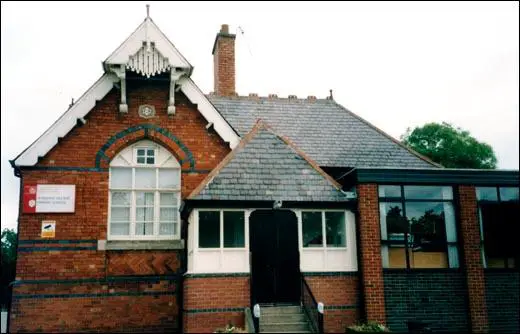
I learned to read really quickly. We had a board with a poster which had the letter beside the picture, and every day, we infants stood by this and chanted a for apple, b for bat, etc. We had 12 reading cards which we read out to Madam at her desk, and then we progressed to books.
I was a bit disconcerted that after lunch I was taken to lie down on a bed in the headmistress's house. I think my mother thought the day might be a bit long for me with a two mile walk and being young. I don't think I did this for too long, but the afternoon was a play time...there was a doll called Betty Oxo. I think most of the village children went home for lunch.
The heating for the school was a stove which the headmistress's husband looked after...I think he had been shell-shocked in the war. There was also one outside chemical loo, which we queued up for at break.
Later on, a woman from up our road, would take me to school with me on my bike, and she on hers. She supervised the school dinners - I think there were only about four of us Later, my mother would come up on her bike, with my sister on a little seat, and we would go for a B.R. I told the headmistress this. She was puzzled - what was a B.R. My mother had to say it was a bicycle ride.
To begin with, we wrote on slates with a charcoal stick. From the beginning I never did seem to understand or get arithmetic - I didn't even manage to pass it at "O level" - neither did my sister, but we both went to university.
One day, the infants were put into a small square off the main playground, because everyone else was playing football. I was not happy about being treated as a second class citizen, so I rebelled and dashed out into the playground, almost immediately to be knocked down by a big boy pursuing the ball. I was told to be a brave soldier, and not to cry. A doctor was called and cleaned me up. No bones broken....
I was happy there and learnt a lot. For my last term as an infant, I had to transfer to another local school, as Seagrave children needed the place. Silbey infants had a young headmistress and several classes and was run on the Froebel method - all play and not much formal learning. My punctuation went out of the window. I also soon learnt to speak like the rest of the pupils, with a good Midlands accent. My mother had to teach my sister to read, but she didn't pick up the accent.
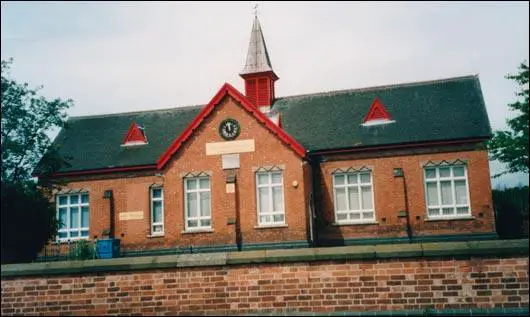
We then moved on to the junior school. A class of 50 pupils - no discipline problems - a mix of men and women teachers. I had a cotton reel thrown at me in the sewing class- I was talking too much - I thought it was another pupil..but it was the teacher.
We had one young male teacher who was very keen on drama... unfortunately, he told the boys to bend over, and he hit the girls' legs... complaints from parents. The headmaster occasionally visited the classroom, brandishing a curly cane. I did see a very clever boy caned on his hand... I don't know why.
The headmaster also used a few of us to pick the soft fruit in his adjoining garden. I shared my violin lessons with the headmaster's older son in a studio/hut in my garden.
The top class was taught by a male teacher who used to read us poetry - The Ice Man Cometh, and Romance, about far flung lands and volcanoes...I always have loved those poems.
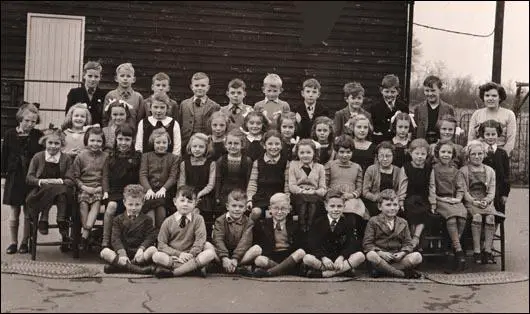
We did have practices from old papers for the 11plus. Most parents worked in the boot and shoe factories, but to "pass the scholarship" was a big thing, and things like bicycles were promised. My parents just said, do your best. I think all my class passed, and some from a parallel class.
All the recreational space was tarmac - one space for the girls, and next to it, an equally large space plus the front playground for the boys. We did skipping and two ball etc. I also played and won lots of marbles - mainly a boys game, chinks and spans, and choc hole, which meant you got all the marbles that you flicked into the hole - this was mainly at home on the bit of grass beside the pavement.
My school days were happy. We had good teachers. There were no discipline problems. We learnt a lot. Nobody stepped out of line. Once in assembly, the headmaster berated two boys who had been stealing birds' eggs.
We didn't have enough reading books! The public library used the school to house its library books - no children's, so I borrowed some of the adult books.. We had a class library in the top class, but if I hadn't had my own books - the latest Jennings books each year, etc. as presents, I would have been less happy...
I think I was lucky...
.
